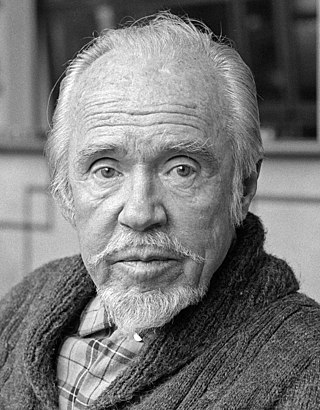Related Research Articles

Morton Feldman was an American composer. A major figure in 20th-century classical music, Feldman was a pioneer of indeterminacy in music, a development associated with the experimental New York School of composers also including John Cage, Christian Wolff, and Earle Brown. Feldman's works are characterized by notational innovations that he developed to create his characteristic sound: rhythms that seem to be free and floating, pitch shadings that seem softly unfocused, a generally quiet and slowly evolving music, and recurring asymmetric patterns. His later works, after 1977, also explore extremes of duration.

Samuel Conlon Nancarrow was an American-Mexican composer who lived and worked in Mexico for most of his life. Nancarrow is best remembered for his Studies for Player Piano, being one of the first composers to use auto-playing musical instruments, realizing their potential to play far beyond human performance ability. He lived most of his life in relative isolation and did not become widely known until the 1980s.

Johannes Georg Fritsch was a German composer.

Christian G. Wolff is an American composer of experimental classical music and classicist.

Alvin Augustus Lucier Jr. was an American experimental composer and sound artist. A long-time music professor at Wesleyan University in Middletown, Connecticut, Lucier was a member of the influential Sonic Arts Union, which also included Robert Ashley, David Behrman, and Gordon Mumma. Much of Lucier's work explores psychoacoustic phenomena and the physical properties of sound.

Frederic Anthony Rzewski was an American composer and pianist, considered to be one of the most important American composer-pianists of his time. From 1977 up to his eventual death, he lived mainly in Belgium. His major compositions, which often incorporate social and political themes, include the minimalist Coming Together and the variation set The People United Will Never Be Defeated!, which has been called "a modern classic".
Joan Linda La Barbara is an American vocalist and composer known for her explorations of non-conventional or "extended" vocal techniques. Considered to be a vocal virtuoso in the field of contemporary music, she is credited with advancing a new vocabulary of vocal sounds including trills, whispers, cries, sighs, inhaled tones, and multiphonics.
David Rosenboom is a composer, performer, interdisciplinary artist, author, and educator known for his work in American experimental music.
Larry Don Austin was an American composer noted for his electronic and computer music works. He was a co-founder and editor of the avant-garde music periodical Source: Music of the Avant Garde. Austin gained additional international recognition when he realized a completion of Charles Ives's Universe Symphony. Austin served as the president of the International Computer Music Association (ICMA) from 1990 to 1994 and served on the board of directors of the ICMA from 1984 to 1988 and from 1990 to 1998.

Steven John Isserlis is a British cellist. An acclaimed soloist, chamber musician, educator, writer and broadcaster, he is widely regarded as one of the leading musicians of his generation. He is also noted for his diverse repertoire and distinctive sound which is deployed with his use of gut strings.
Daniel James Wolf is an American composer.

Christoph Wolff is a German musicologist. He is best known for his works on the music, life, and period of Johann Sebastian Bach. Christoph Wolff is an emeritus professor of Harvard University, and was part of the faculty since 1976, and former director of the Bach Archive in Leipzig from 2001 to 2014.

Schwabach is a German city of about 40,000 inhabitants near Nuremberg in the centre of the region of Franconia in the north of Bavaria. Together with the neighboring cities of Nuremberg, Fürth and Erlangen, Schwabach forms one of the three metropolitan areas in Bavaria. The city is an autonomous administrative district. Schwabach is also the name of the river which runs through the city prior to joining the Rednitz.
Philip Lionel Corner is an American composer, trombonist, alphornist, vocalist, pianist, music theorist, music educator, and visual artist.
Garrett List was an American trombonist, vocalist, and composer.
Bernd Alois Zimmermann was a German composer. He is perhaps best known for his opera Die Soldaten, which is regarded as one of the most important German operas of the 20th century, after those of Berg. His eclectic music, which employs a wide range of techniques including dodecaphony and musical quotation, encompasses the styles of the avant-garde, serial, and postmodern.
Zimmermann is a German occupational surname for a carpenter. The modern German terms for the occupation of carpenter are Zimmerer, Tischler, or Schreiner, but Zimmermann is still used.
New Simplicity was a stylistic tendency amongst some of the younger generation of German composers in the late 1970s and early 1980s, reacting against not only the European avant garde of the 1950s and 1960s, but also against the broader tendency toward objectivity found from the beginning of the twentieth century. Alternative terms sometimes used for this movement are "Inclusive Composition", "New Subjectivity", "New Inwardness", "New Romanticism", "New Sensuality", "New Expressivity", "New Classicism", and "New Tonality" (neotonality).

The Aesthetic Research Centre (A.R.C.) was a Canadian publisher of academic books, scientific journals, LP recordings and graphic scores in the field of sound sculpture, Avant-garde music and process music, as well as neurofeedback in the arts.
Thomas Demenga is a Swiss composer and cellist.
References
- Zimmermann, Walter (1976). Desert Plants: Conversations With 23 American Musicians. Vancouver, British Columbia, Canada: A. R. C. Publications.